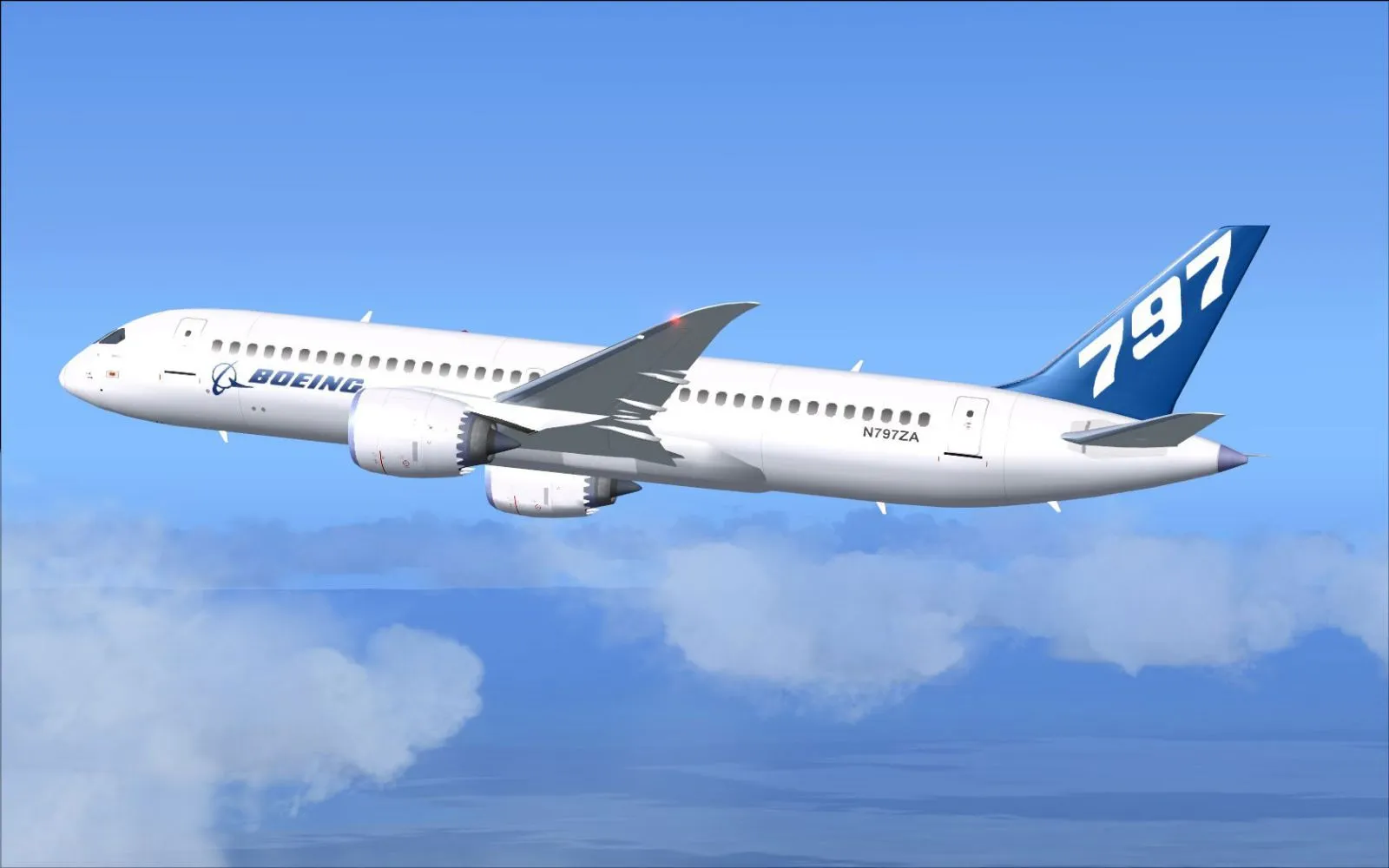
Boeing continues technology work on 797
Jan 29, 2021

Boeing is actively advancing its technology development for the 797, its forthcoming mid-market airplane. The company is focused on integrating innovative systems to enhance performance, efficiency, and passenger comfort. Recent efforts include exploring new materials and aerodynamic designs that could redefine operational capabilities in this segment. Boeing's commitment to sustainability is also evident, as they aim to incorporate eco-friendly technologies to reduce emissions and improve fuel efficiency. The ongoing research and development efforts signal Boeing's dedication to meeting evolving market demands and positioning the 797 as a competitive option for airlines seeking versatile and economical solutions.
Boeing has long been a leader in the aerospace industry, consistently pushing the boundaries of innovation and technology. As the company continues its work on the much-anticipated "Boeing 797", the excitement surrounding this new aircraft is palpable. With a focus on efficiency, sustainability, and passenger comfort, Boeing is set to redefine air travel in the coming years. This article delves into the technology advancements Boeing is pursuing for the "797", showcasing its commitment to remaining at the forefront of aviation innovation.
Innovative Technology for the Boeing 797
The "Boeing 797" aims to incorporate cutting-edge technologies that enhance performance and reduce environmental impact. Some key areas of focus include lightweight materials, advanced aerodynamics, and efficiency-enhancing propulsion systems.
| Technology Area | Description |
|---|---|
| Lightweight Materials | Utilization of composite materials to reduce weight and improve fuel efficiency. |
| Advanced Aerodynamics | Design enhancements that reduce drag and improve overall flight performance. |
| Propulsion Systems | Next-generation engines that provide greater thrust while consuming less fuel. |
Boeing's commitment to sustainable aviation is evident in its research and development efforts. The "797" is designed to meet increasing regulatory requirements for emissions while also appealing to the environmentally conscious traveler. By leveraging new technologies, Boeing aims to create an aircraft that not only meets but exceeds these expectations.
Passenger Experience on the Boeing 797
In addition to technological advancements, Boeing is also focused on enhancing the "passenger experience" with the 797. The design team is exploring various cabin layouts and features that prioritize comfort and convenience. This includes improved seating arrangements, enhanced in-flight entertainment options, and more spacious overhead storage.
| Passenger Feature | Description |
|---|---|
| Comfortable Seating | Ergonomically designed seats that provide greater support and comfort during long flights. |
| Advanced In-Flight Entertainment | State-of-the-art systems offering a wide range of entertainment options for passengers. |
| Increased Cabin Space | Redesigned cabin layout to maximize space for both passengers and their luggage. |
By focusing on these enhancements, Boeing is not only aiming to attract airlines but also to create a more enjoyable travel experience for passengers. The "Boeing 797" promises to be a game-changer in the industry, catering to the evolving preferences of modern travelers.
Market Position and Competitive Landscape
The development of the "Boeing 797" comes at a crucial time as the aviation market is experiencing a shift towards more fuel-efficient and environmentally friendly aircraft. Boeing’s main competitor, Airbus, has also been making strides in this area with its own aircraft designs. As both companies vie for market share, the introduction of the "797" is expected to significantly impact the competitive landscape.
| Competitor | Key Aircraft | Focus Area |
|---|---|---|
| Airbus | A321XLR | Long-range efficiency and passenger comfort. |
| Boeing | 797 | Sustainability and advanced technology. |
As airlines look to modernize their fleets, the "Boeing 797" is well-positioned to meet these needs. With an emphasis on sustainability and technology, Boeing’s latest offering could redefine the standards of air travel.
Future Outlook for the Boeing 797
Looking ahead, the future of the "Boeing 797" appears bright. With ongoing advancements in technology and a commitment to passenger satisfaction, Boeing is on track to introduce an aircraft that meets the demands of both airlines and travelers. The anticipated launch timeline for the "797" suggests that it may become a reality sooner than many expect, potentially reshaping the aviation landscape.
As Boeing continues to refine its technology and finalize the design of the "797", the industry will be watching closely. The combination of innovative engineering, a focus on sustainability, and an enhanced passenger experience could position the "Boeing 797" as a frontrunner in the next generation of commercial aircraft.
In conclusion, Boeing’s ongoing work on the "797" reflects its dedication to innovation and leadership in the aerospace sector. With advanced technologies and a clear vision for the future of air travel, the "Boeing 797" is set to make a significant impact in the aviation market for years to come.
Related Articles

Explore Thailand: The Best Islands to Visit for Paradise, Adventure, and Relaxation

The Ultimate Guide to the Best Islands in Thailand for Your Next Getaway

Do babies need passports? How to get a passport for a newborn

How to get a U.S. passport fast: here’s how to expedite the process

What is Mobile Passport Control: 5 reasons why you should use it

SENTRI vs. Global Entry: A detailed guide

Do you need a passport to go to the Bahamas? Let’s find out

Do you need a passport to go to Mexico? A detailed guide

Do you need a passport to go to Canada? We got the answer

Do You Need a Passport for a Cruise: An Essential Travel Guide

Booster Seat Requirements: All the Rules to Follow in Your Rental Car

What Are the World’s Most Powerful Passports, and How Does Yours Rank?

How to Take a Passport Photo at Home: A Helpful Guide

You've got to have heart! Southwest's new livery

Your opinion: Should water be free on low cost carriers?

Young women bolder than guys as solo travellers
